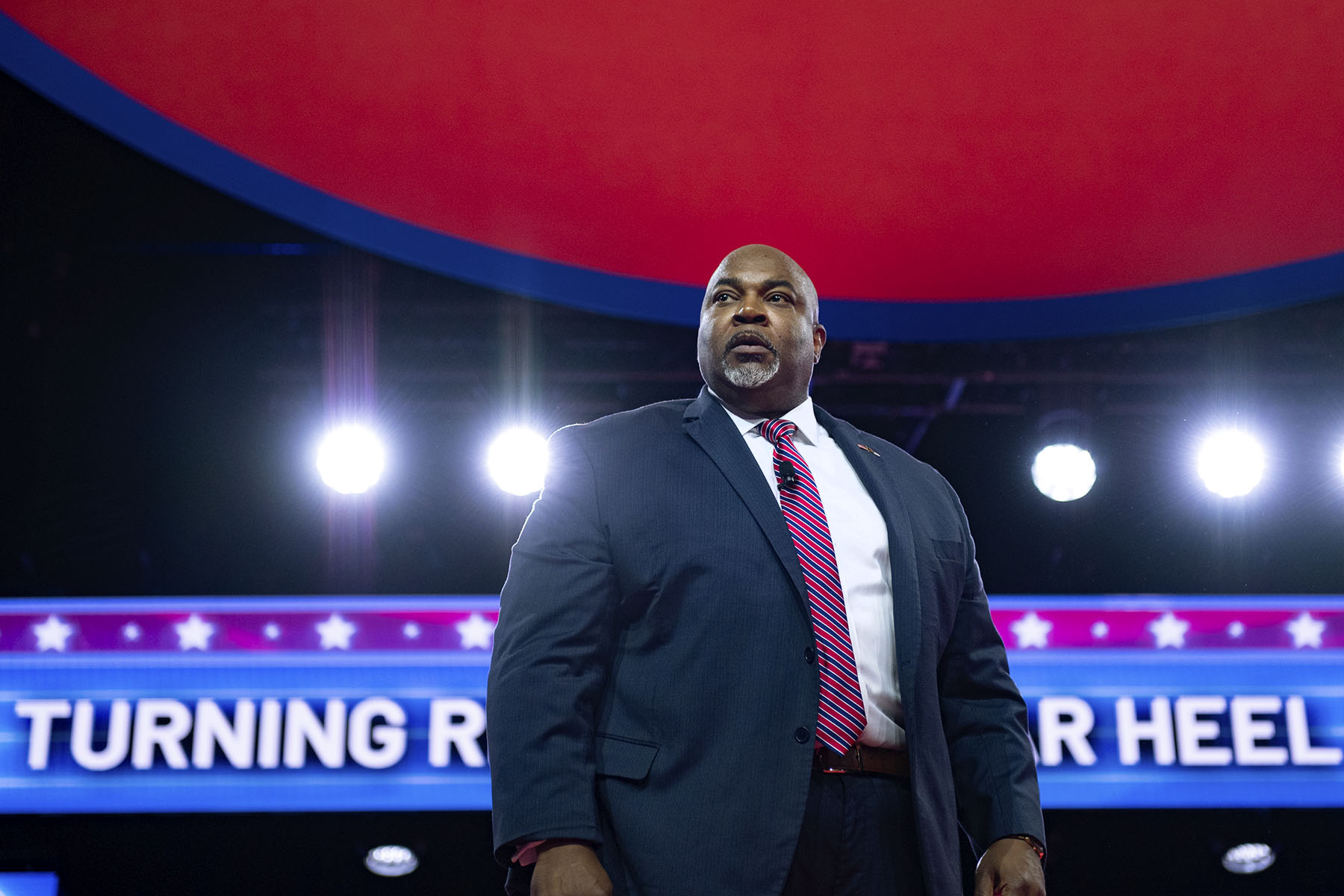North Carolina Republican gubernatorial nominee Mark Robinson has a long history of attacking influential women in personal and often vulgar terms. But Robinson has reserved particular vitriol for Black women in positions of power, with many of his social media postings invoking misogyny, racism, homophobia and transphobia.
Experts and advocates say Robinson’s candidacy and his easily winning the Republican nomination reflect both the incentives within the Republican Party to appeal to the extremes with inflammatory language and stances — and how major tech platforms have enabled the spread of hateful content disproportionately harming Black women.
“As it relates to Black women in particular, we know that they have historically been plagued by biases and disparities that reflect broader issues of representation and diversity within this country,” said Esosa Osa, founder and CEO of Onyx Impact, a nonprofit organization focused on Black voters’ civic engagement and combatting disinformation.
“As they become more visible on any platform, their presence is weaponized,” Osa said.
Robinson, the state’s first Black lieutenant governor who has made frequent speaking appearances at churches, rose to prominence with his far-right views, embrace of conspiracy theories and incendiary rhetoric at the pulpit and on social media. Throughout his career, Robinson has espoused anti-abortion and anti-LGBTQ+ stances — including stating that God “formed” him to fight LGBTQ+ acceptance.
Robinson will face Democrat Josh Stein in one of the most competitive and consequential governor’s races this year. If elected, Robinson would be North Carolina’s first Black governor. His candidacy comes at a time when the Republican Party is attempting to win over more Black voters in battleground states like North Carolina.
But, Osa said, nominating a Black candidate doesn’t mean the Republican Party will win over Black voters, especially Black women, who are the core of the Democratic Party’s base. Osa said Robinson’s rise comes from a “historical lack of curiosity about the Black voter” and described him as a “tsunami of anti-Black disinformation.”
“I think that the current media landscape is set up to amplify division, amplify hate and amplify biases,” Osa said. “The GOP, in particular, is benefiting from the social media landscape that these tech companies have allowed to proliferate. And it says a lot about your efforts to court Black voters when these are the types of candidates that rise to the top.”
Moya Bailey, a Black feminist scholar and professor of communication studies at Northwestern University, first coined the term “misogynoir” to characterize the intersection of misogyny and racism uniquely targeted toward Black women.
In an email to The 19th, Bailey said Robinson’s postings show how misogynoir “is an equal opportunity form of discrimination” weaponized by Black and non-Black people alike.
“Robinson joins a long line of Black men of various political stripes who use misogynoiristic ideas about Black women for their own political gain,” she said. In a world where demeaning Black women can help someone boost their own career, “it’s no wonder that his vitriol is so consistent.”
Robinson’s extensive social media history, including several previously unreported posts, shows how he used his Facebook page to cultivate his incendiary political brand for years before his successful first run for office in 2020.
In doing so, Robinson has gone after a number of prominent women in politics — and women who have accused prominent men of sexual misconduct. Many of his attacks over the years have often been based in racist stereotypes.
In 2017, Robinson posted a meme referring to Rep. Frederica Wilson of Florida as a “lying, liberal, bottom feeding, pond scum” and “dressing like a rejected drag queen from Brokeback Mountain,” as first reported by the Huffington Post.
He has taken particular aim at former First Lady Michelle Obama, calling her an “angry anti-American communist Black lady” and saying she speaks “ghetto” and “wookie.” She was among the targets of previously unreported Facebook posts by Robinson:
In 2012, Robinson reposted a meme criticizing the cost of the outfit Obama wore at the Kids’ Choice Awards. The meme included a graphic of an ObamaCard paid for by the taxpayer, feeding into racist tropes depicting Black women as dependent on government assistance.
In January 2017, Robinson posted a meme with text overlaying a photo of former President Bill Clinton, former First Lady Hillary Clinton and Obama at former President Donald Trump’s presidential inauguration reading: “That look you get when you see a 1st lady who’s not an old hag or a drag queen.” The meme was watermarked “M. Robinson memes.”
In an October 2017 post, he referred to Rep. Maxine Waters as “Ol’ Maxie Pad Waters” in criticizing comments she made about Trump.
A Robinson campaign spokesperson did not respond to a request for comment.
Robinson has long promoted what he sees as a Biblical view of masculinity, once stating in 2022 he believes “we are called to be led by men” and that “when it was time to face down Goliath,” God “sent David, not Davita. David.”
In a previously unreported sermon he delivered in July 2020, Robinson said he believes he and God are “full of machismo.”
“We need our own men to stand up and teach our young men how to be men. And when I say men, I mean manly men. I’m talking about the kind of manly men that they want to say, ‘You’re a male chauvinist pig’ or ‘You’re full of machismo’ — you better believe I am,” Robinson said. “God put that in me to be a man. There’s not anything feminine standing before you.”
He added: “God created me for a purpose, and more importantly, he created me in his image. So maybe God is full of machismo too.”
In other previously unreported Facebook posts, Robinson attacks the #MeToo movement holding powerful men accountable for sexual violence and misconduct as an attack on masculinity. In 2017, he wrote that leftists were not combatting a “pervasive culture of sexual harassment” but “creating a weapon with it.” In numerous posts, Robinson both mocked and cast doubt on accusations of sexual assault against figures like Harvey Weinstein, R. Kelly and disgraced actor Bill Cosby, including insulting the appearances of accusers.
He also posted in defense of Trump following the release of the infamous “Access Hollywood” tape days before the 2016 election, writing: “I don’t think Trump is a ‘disgusting pervert’ for saying what he said. The ‘disgusting pervert’ is the guy who taped it.” Robinson also downplayed allegations against Judge Roy Moore, the Alabama U.S. Senate candidate who was accused by multiple women of sexually assaulting them when they were teens.
In a January 2019 Facebook post, Robinson wrote that masculinity was “under assault” by the left and that “satan and his agents” were attacking men. He further charged that the media was focusing on “high-profile abusers in an effort to demonize men.” In another January 2019 post, Robinson suggested chaperones as a way to prevent “date rape.”
Shaunna Thomas, co-founder and executive director of the advocacy group UltraViolet, which works to combat sexism in popular culture and on tech platforms, argued that social media platforms have failed to curb hateful speech at the expense of Black women’s online safety and a healthy democracy. Robinson’s posts, she said, are also emblematic of how social media platforms helped fuel the massive backlash to the #MeToo movement, which includes discrediting and insulting survivors.
“What was a very inspiring, power-building, majoritarian moment around sexual assault really got drowned out by forces that were profiting off of misogyny,” she said. “There is always a backlash, but this backlash was massive and has had real staying power in large part because of the way platforms operate.”
Osa, a former senior adviser to Georgia Democratic gubernatorial nominee Stacey Abrams, said she’s working to combat the “lack of infrastructure” protecting Black communities from disinformation aimed at suppressing voter engagement.
And while she sees “increasingly sophisticated” disinformation campaigns targeting Black women and Black voters, she believes they will still reject candidates like Robinson.
“Black women are some of the most consistent voters that we have in our electorate,” she said. “I think that when parties back candidates like Mark Robinson that have such a history of harmful, racist, anti-Black narratives, you will see Black men and Black women come out and stand against it.”
Correction: An earlier version of this article incorrectly identified Robinson as a pastor.







